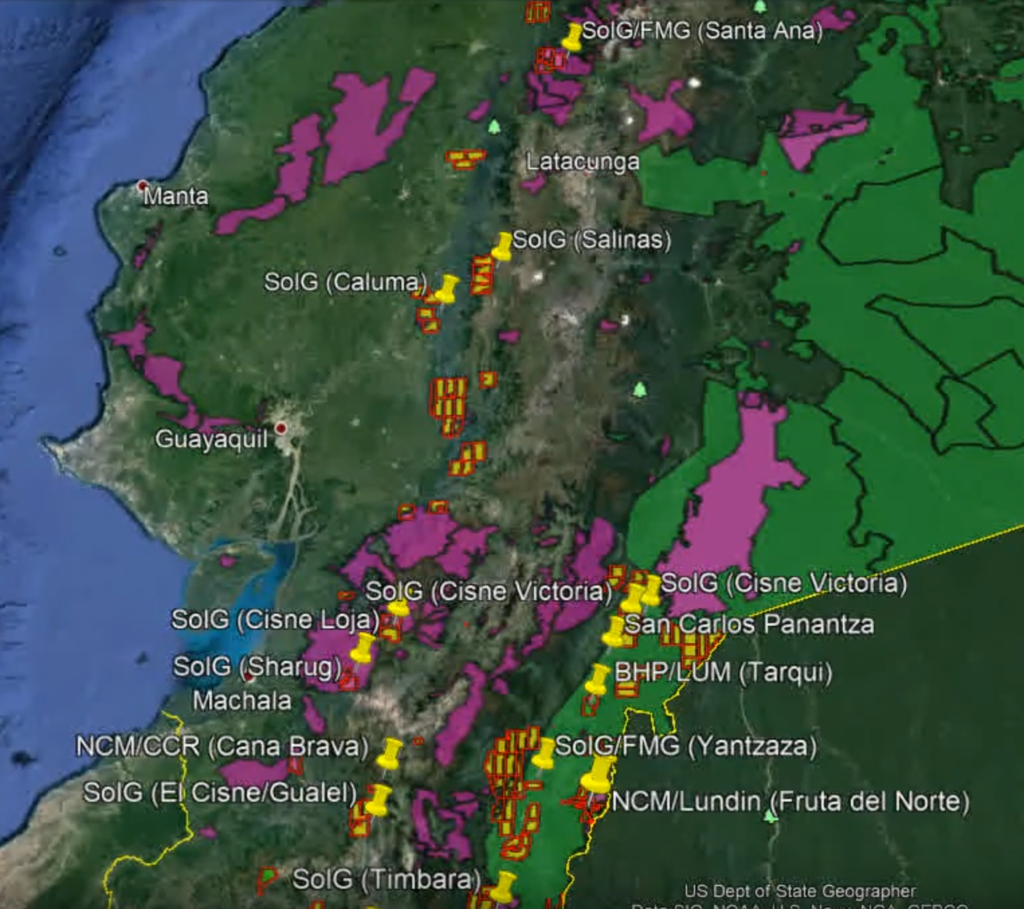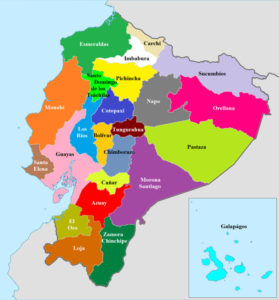SolGold joins Rinehart with trouble in Ecuador
August 6, 2019
SolGold joins Gina Rinehart’s Hancock Prospecting as the latest Aussie company to face challenges on their Ecuadorian mining concessions. Illegal miners who were evicted from Rinehart’s concession at Buenos Aires in July, have been active on SolGold concessions in the Imbabura and Carchi provinces, while ongoing community resistance is thwarting SolGold’s plans to develop mining operations in the country. Despite PR announcements to the contrary, SolGold is facing a wave of resistance from locals who want the company and its subsidiaries out of their parishes.
The biggest headache for SolGold in Ecuador centres around ambiguities over the legal status of many of its concessions (including at least half of its "priority projects") due to concerns over Indigenous land, Protected Forests and a constitutional requirement for consultation with local communities. Widespread resistance from local communities to industrial scale mining, and rampant illegal mining (often with ties to international criminal cartels), seem likely to further derail hopes the company has of launching a successful mining operation in the country.

Community unrest
The province of Loja has been a hotbed of unrest for years. A successful court case against Chinese mining company Junefield shut down operations at their Rio Blanco mine in August 2018. In latest news, residents of Gualel who are surrounded by three SolGold concessions (El Cisne 2A/2B/2C), plan to radicalise protests if mining concessions are not withdrawn. They propose to march with residents from the Azuay, Loja, El Oro and Zamora Chinchipe provinces, stating on 30 July that if they are not heard they will go on a hunger strike.
More meetings are expected to take place in the first weeks of August in parishes and cantons in Zamora Chinchipe that are threatened by mining activity.
Popular consultations against mining
Numerous local parishes and cantons have been voting on mining across the country in recent months. These popular votes could form a significant legal challenge for the government and impede the development of mining projects across the country.
After a massive event involving 140 delegates from the provinces of Esmeraldas, Carchi, Imbabura and Sucumbíos, the Awá announced on 25 July the total rejection of mining in the territory. This was the fourth time they had passed a mandate to ban mining in their territory. SolGold holds 3 concessions that overlap Awá territory, while one is held by Hanrine Ecuadorian Exploration and Mining SA (HEEM) – a Rinehart-owned subsidiary.
“This resolution prohibits mining intervention in Awá territory and megaprojects that are not in line with the needs of our people. Our territory must be respected,” said Jairo Cantincus, president of the Awá.
Further south, communities and social organizations in the Bolivar province announced they want SolGold subsidiary Valle Rico mining out of the region, with a declaration on 28 July 2019 declaring the parish free of mining and calling for a permanent mobilisation to defend its territory of the mining company Valle Rico resources.
On the 30th July, a protection action was presented in the Yantzaza canton in the Zamora Chinchipe province to reject mining in Alto Nangaritza, where SolGold holds six concessions. This was due to this area being part of the Cerro Plateado biological reserve and declared Protected Forest by ministerial agreement.
SolGold stocks took a battering in May after media reports of a potential referendum on mining in Imbabura, where Cascabel is located. The case by Wilmer Meneses Ibarra hinged around the lack of community consultation. However, the Constitutional Court ended up throwing it out because applicant failed to adhere to the procedural requirements for launching such a case. The core concerns of the community regarding consultation were not addressed.
This point was largely overlooked in international media, with Reuters claiming on July 31 that: “the Constitutional Court ruled against a request to require community consultations over the Cascabel mine”. Such a ruling would potentially contravene SolGold’s UN and OPEC obligations in which foreign companies must ensure the support of Indigenous and local groups before proceeding with such an enterprise.

There have been at least five similar cases where the application was competently presented which proved successful, showing that courts do generally support communities’ claims about the lack of consultation. Three landmark cases over the past year involving the communities of the Waorani, the A’I Cofán and the Rio Blanco mine in Cuenca were won because the government had not informed communities their territories were being opened up for oil or mineral exploitation.
Indigenous Kichwa Prefect Yaku Perez, an environmental and human rights lawyer, has been assisting parishes within the Azuay province to vote on mining in order to establish a proper consultation process.
Pérez presented a petition to the Constitutional Court to ban mining in the Azuay province on July 22 after his call for popular consultation in the Provincial Chamber of Azuay passed with a simple majority, but did not achieve the three-fourths majority that would allow it to be immediately executed. The Constitutional Court has twenty days to make a decision.
If the Constitutional Court agrees to a popular consultation, mining companies may be able to sue the Ecuadorian government before an international tribunal for reneging on its commitments. Such a case could put mining interests on hold for years.
Voters in the Girón canton in Azuay voted overwhelmingly to ban mining on March 24, with 86.79 per cent of the canton’s 15,000 voters rejecting mining in the area. SolGold has two priority projects in Azuay: 'Cisne Loja' and 'Sharug'. Sharug entirely covers a Protected Forest, while Cisne Loja – comprised of two concessions – has approximately 90 per cent of one concession within a Protected Forest, while about 15 per cent of the other is within Protected Forest.
On top of this, there is near unanimous community opposition in the region. Illegal mining raids by the Ecuadorian Army in Azuay on the 31st of July were also only 30 kilometres away from these projects.
Illegal mining
Illegal mining is becoming the poster child for chaos for mining investors, with the Ecudorian Army being sent into the provinces of Carchi and Imbabura in July to attempt to secure the area after illegal miners were found prospecting there. SolGold holds nine concessions in the region under the subsidiary Carnegie Ridge Resources S.A.
This is in the wake of military evictions at the illegal mining operation at Buenos Aires, on concessions owned by Gina Rinehart in July, when more than 5000 local and international miners were evicted. Buenos Aires had up to 10,000 miners descend on the region at the height of its activity. Mining operations were purportedly run by various militia groups – with Colombian, Venezuelan and Mexican crime cartels vying for control.
These illegal miners are now exploring other prospective sites in the country using mining company reports to scour for likely locations.
Rainforest Action Group summary
The Rainforest Action Group is a research and advocacy group investigating Australian mining companies and their operations, particularly in Ecuador. Rainforest Action Group spokesperson Martin Daley says it is clear that despite government claims to the contrary, mining in Ecuador is not wanted.
“We are very concerned that Australian mining companies such as SolGold are continuing to push forward with plans to mine in the area, despite Indigenous and local communities clearly being resistant to these plans,” Martin says.
“Copper is being greenwashed as a sustainable resource to fuel the growing electric car market, however it comes at a great cost to the Andean and Amazonian biospheres, which include some of the last virgin tropical rainforests in the world, and the world's most biodiverse ecosystems.”
“Recent studies show that planting 3 trillion trees might be the most effective way of combatting climate change. We believe that protecting and extending the rich ecosystems that are already in place is a far more sustainable outcome, as is supporting local people to build economies that are not dependent on fossil fuels or mining. Global development just cannot continue at the rate it has been.”
With thousands expected to join protests planned in Melbourne in October to oppose the International Mining and Resources Conference (IMARC) and protest government inaction on climate change, it is apparent that resistance to mining is growing globally.
SolGold holds 75 mineral concessions in Ecuador through four subsidiaries. Financial Times states that: “Year on year SolGold plc's net income fell 341.77% from a loss of 4.42m to a larger loss of 19.52m despite flat revenues”.
A flyover of Ecuador here shows SolGold concessions, overlaps with Protected Forests and Indigenous territories, and community conflicts. Maps by Rainforest Action Group and Forest Network.
Contact details and full media release with appendices here.
